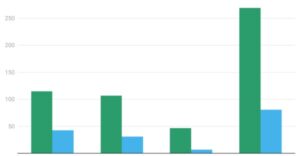As in the United States, access to abortion is difficult, even prohibited—not only in Poland, but also in Romania and Hungary. These countries bordering Ukraine host several hundred thousand Ukrainian war refugees on their soil, who sometimes have no choice but to have an abortion in another country.
Warsaw (Poland), Bucharest (Romania)– “Ukrainian refugees who have been raped and need an abortion often just tell us on the phone: I have an unwanted pregnancy. Someone did something to me, can you help me?” explains Antonina Lewandowska, employee of Federa, the Foundation for women and family planning in Poland.
This pro-choice activist does not dare to imagine what these women had to go through while fleeing the war: undergoing rape, possibly losing their loved ones and/or everything they owned to come and take refuge in a country whose language they do not know. … and in which it is actually impossible to access an abortion for rape.
“Abortion in the event of rape or incest is certainly legal in Poland, but the rape must be reported to the police and the prosecutor must draw up a document attesting to this. Then, it is to be hoped that the doctor within the public hospital will not activate his conscience clause. And you only have 12 weeks: in other words, for Ukrainian refugees, it’s a waste of time, or almost,” continues the 20-year-old.
And in fact, in Poland, which has 38 million inhabitants, only a few rare abortions take place each year for rape. In this country governed by the national conservatives of the Law and Justice (PiS) Party since 2015, abortion was banned in the event of serious fetal malformations in 2021. Since then, it has only been possible when the life and health of the women are in danger or if the pregnancy is the result of rape – access which, in both cases, leaves something to be desired, as several tragic deaths of women who have been refused abortion by the medical profession have shown.
The 3.5 million refugees from Ukraine who have passed through the country (there are 1.5 million who have settled there permanently) are accommodated in the same way as Polish women, who, even in cases of rape, opt for medical abortions at home or go abroad.
Faced with the influx of Ukrainian refugees, Federa recruited a Ukrainian gynecologist, herself exiled in Poland, to operate a new helpline. The organization has already allowed several Ukrainian women to invoke damaged mental health, one of the few grounds still allowing them to obtain a legal abortion in Poland, involving the opinion of psychiatrists.
Federa is not the only one: it is part of a vast solidarity network, already well established in Poland, facilitating access to an abortion in complete safety. Abortion Without Borders, for example, a coalition of six organizations, is more mobilized than ever. It has an SOS IVG number in Poland, which allows you to refer everyone according to their needs, and which often redirects to Women Help Women, an organization registered in the Netherlands, responsible for sending medical abortion medication (two pills) to their home.
“Abortion Without Borders has enabled 34,000 people in Poland to access an abortion [between October 2020 and October 2021 – editor’s note] and we are going to help many Ukrainian women, because unfortunately Poland does nothing when it comes to women’s reproductive rights,” says Kinga Jelińska, head of Women Help Women. “The system is oppressive, but there are a lot of innovations and very useful organizations,” adds this Polish woman living in the Netherlands.
Since February 24th, Abortion Without Borders has already helped nearly 400 Ukrainian women based in Poland to access an abortion, many of whom have been able to go abroad. Because beyond 12 weeks of pregnancy, when abortion pills become less effective, it is the only safe option to end an unwanted pregnancy.
In Hungary, a conditional legal abortion
In Hungary, where surgical abortion is legal until the twelfth week of pregnancy, access to it is far from ideal. In particular, it is conditional on two mandatory interviews with childcare workers. The morning after pill is only available on prescription – as in Poland, where it is also not reimbursed by Social Security.
And medical abortion has never been authorized by the conservatives currently in power. Even if it means paying, several hundred Hungarian women opt each year for an abortion in Austria, 2.5 hours from Budapest. Some Ukrainian refugees in Hungary must also resolve to do so. Because even in the event of rape, one of the two consultations with nursery nurses remains obligatory. And nothing has been planned by the authorities for the translation.
“Ukrainian refugees do have access to surgical abortion in Hungary, in the name of the temporary protection granted by the EU. But we try to redirect women requiring an abortion to Austria, because abortion is a traumatic and time-consuming procedure in Hungary. There is no cooperation with the government, which pushes very Christian rhetoric and tries to silence the NGOs,” explains ÁgnesSzalóki, project coordinator at the Patent association.
This Hungarian association for the defense of women’s rights has accompanied a Hungarian-speaking Ukrainian and an exile from third countries throughout their journey to access an abortion in Hungary for the past four months. Doctor Fiala, gynecologist at the Gynmed clinic in Vienna, confirms that he receives about five Ukrainian patients a week. “We didn’t have them at all before the war because they could abort in Ukraine. “Some have found refuge in Austria, but others come from Hungary and Poland, “where it is difficult for them to abort,” indicates the doctor.
In Romania, abortion is less and less available
On the southern border of Ukraine, in Romania, Ukrainian women fleeing the conflict and wishing to terminate their pregnancies also experience disappointments. “But why have an abortion? If her husband dies in Ukraine, at least she will have her child with her. At the other end of the line, Irina Popescu-Mateescu winces. The midwife receives this answer from a Romanian public hospital, while helping a Ukrainian refugee to obtain a voluntary termination of pregnancy.
She is less than six weeks pregnant. Upon her arrival in Romania, the young refugee found the number of the hotline created by Irina and her colleagues from the Independent Association of Midwives. Since the start of the war in Ukraine, they have already advised and assisted around a hundred people. “This woman is for the moment the only one that we support morally and financially to have an abortion, and it’s not an easy task,” describes the midwife. She ends up finding them a public hospital that will agree to prescribe a medical abortion, which is legal.
More than a million Ukrainians have entered the border country since the start of the war in Ukraine, and nearly 34,000 of them benefit from the European temporary protection mechanism. “We started by hosting them. Then access to reproductive health became a priority, adds Irina. In theory, the mechanism allows access to care free of charge, but, in practice, the situation is more complicated and varies according to each country.”
In Romania, the right to abortion was the first law passed after the 1989 revolution, which put an end to the communist dictatorship of [former president]Ceaușescu—a symbolic decision in a country where abortion and contraception had been strictly prohibited since 1966. Thirty years after the fall of the regime, the situation has deteriorated in this country of 20 million inhabitants, with more and more gynecologists who refuse to perform abortions for moral or religious reasons.
More hindered access for precarious women
And the pandemic has not helped matters: until March 2022, abortion was no longer considered an urgent operation, and, at certain times, it was only possible in one in ten public hospitals, among those who practiced the normal operation. In Romania, abortion can be done in the public as well as in the private sector and is only reimbursed in the event of malformation of the fetus. Its cost can be significant – up to 700 euros in the private sector – while the gross minimum wage is only 460 euros per month.
Once the bulk of the pandemic danger passed, in 2022, more than half of the public hospitals that previously performed abortions no longer do so, according to CentrulFilia, a Romanian activist with the association for women’s rights. Worse, Polizu, the most accessible public hospital in Bucharest for abortions, gave up. “The only gynecologist who performed abortions in this hospital has thrown in the towel,” laments AndradaCilibiu, an employee at CentrulFilia . He has performed thousands of abortions alone over the past two years, including for many women from regions outside the capital. That is the extent to which abortion has become difficult to access.”
According to her, it is access to information that is most lacking. If the Polizu hospital publicly displayed that it practices abortion, this is not necessarily the case in other establishments. “When we call some of them, the central secretariat tells us that abortion is not practiced there, while doctors and interns from the said hospital do it, however,” specifies AndradaCilibiu . Finally, you can have an abortion in Romania but only if you live in certain cities, if you know someone who knows a doctor who performs abortion. And if you have money. For the refugees, it’s all the more complicated because they don’t have a network or the means, and don’t speak the language.”
Irina Popescu-Mateescu and her colleagues will remedy this by creating a website in Romanian, English and Ukrainian, which will bring together all the information on reproductive health in Romania. They take the example of their neighboring country, Moldova, which has set up the abort.md site and the prescription for a medical abortion by telemedicine for more than a year. “They are ahead in this area, while the country is poorer and hosts nearly 100,000 refugees. In our country, the avort.ro site is in fact run by anti-choice activists and telemedicine is still at the project stage,” regrets the midwife.
She, who worked at the Ministry of Health in 2021, knows how difficult decision-makers are to convince. When she asks ministry officials to provide access to abortion for refugees and to legislate on telemedicine, she is told that “it’s the last thing these women think about.”
Courtesy Mediapart




